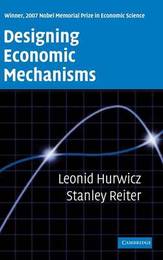
|
Designing Economic Mechanisms
Hardback
Main Details
| Title |
Designing Economic Mechanisms
|
| Authors and Contributors |
By (author) Leonid Hurwicz
|
|
By (author) Stanley Reiter
|
| Physical Properties |
| Format:Hardback | | Pages:356 | | Dimensions(mm): Height 229,Width 152 |
|
| Category/Genre | Economics |
|---|
| ISBN/Barcode |
9780521836418
|
| Classifications | Dewey:330.015195 |
|---|
| Audience | | Professional & Vocational | |
|---|
|
Publishing Details |
| Publisher |
Cambridge University Press
|
| Imprint |
Cambridge University Press
|
| Publication Date |
22 May 2006 |
| Publication Country |
United Kingdom
|
Description
A mechanism is a mathematical structure that models institutions through which economic activity is guided and coordinated. There are many such institutions; markets are the most familiar ones. Lawmakers, administrators and officers of private companies create institutions in order to achieve desired goals. They seek to do so in ways that economize on the resources needed to operate the institutions, and that provide incentives that induce the required behaviors. This book presents systematic procedures for designing mechanisms that achieve specified performance, and economize on the resources required to operate the mechanism. The systematic design procedures are algorithms for designing informationally efficient mechanisms. Most of the book deals with these procedures of design. When there are finitely many environments to be dealt with, and there is a Nash-implementing mechanism, our algorithms can be used to make that mechanism into an informationally efficient one. Informationally efficient dominant strategy implementation is also studied.
Author Biography
Leonid Hurwicz is Regents' Professor of Economics Emeritus at the University of Minnesota. Internationally renowned for his pioneering research on economic theory, particularly in the areas of mechanism and institutional design and mathematical economics, he received the national Medal of Science in 1990. A member of the National Academy of Sciences and the American Academy of Arts and Sciences, Professor Hurwicz is a former President and Fellow of the Econometric Society. The recipient of six honorary doctorates, he serves on the editorial board of several journals and coedited and contributed to two collections for Cambridge University Press, Studies in Resource Allocation Processes (1978, with Kenneth Arrow) and Social Goals and Social Organization (1987, with David Schmeidler and Hugo Sonnenschein).His recent publications include papers in Economic Theory (2003, with Thomas Marschak), Review of Economic Design (2001, with Stanley Reiter), and Advances in Mathematical Economics (2003, with Marcel K. Richter). Stanley Reiter is Morrison Professor of Economics and Mathematics in the Weinburg College of Arts and Sciences and Morrison Professor of Managerial Economics and Decision Sciences in the Kellogg School of Management, Northwestern University, where he directs the Center for Mathematical Studies in Economics and Management Science. He previously served as Krannert Professor of Economic and Mathematics at Purdue University. A Fellow of the American Academy for the Advancement of Science, the American Academy of Arts and Sciences, the Guggenheim Foundation, and the Econometric Society, Professor Reiter is coauthor (with Kenneth R. Mount) of Computation and Complexity in Economic Behavior and Organization (Cambridge University Press, 2002). He also edited Studies in Mathematical Economics (1987), coedited Information, Incentives, and Economic Mechanisms (1987), and serves as Associate Editor of the journals Economic Design and Complex Systems.
Reviews'Economic mechanism design has both theoretical and practical importance. This book, by two founders of the field, provides a wonderful guide for those who would design mechanisms. It is a major achievement, providing deep insights based on the authors' experience and wisdom. It should be required reading for all.' John Ledyard, California Institute of Technology 'This book shows how a mechanism designer, given the organization's goal, can construct a decentralized mechanism, wherein no agent directly reveals private information and yet, through message exchanges that are minimal (in an appropriate sense), enough information is gathered so that goal-fulfilling actions can be taken.' Thomas A. Marschak, University of California, Berkeley 'In this masterly and important book, Leonid Hurwicz, the founder of the theory of mechanism design, and Stanley Reiter, a leading pioneer in the field, consolidate their long-standing collaboration on how to design mechanisms that achieve society's allocational goals.' Eric Maskin, Nobel Laureate, Princeton University 'The introduction to economic theory of mechanism design, the formal analysis of economic institutions, is one of the most important developments in economics in the last half century. This book both describes and extends the state of understanding in a large and important segment of mechanism design and will define the frontier of the area for some time to come.' Andrew Postlewaite, University of Pennsylvania 'This book's innovative techniques can be useful for finding feasible solutions in both theoretical and applied statistical multivariable optimization problems.' Stan Lipovetsky, Technometrics
|